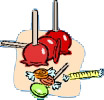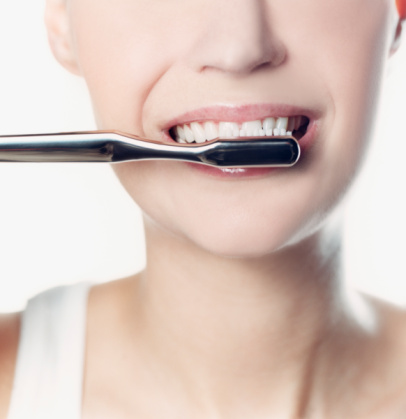Main Articles
Children and Dental Care
It is very important to get children into a dental routine from an early age. As a parent, it is critical to begin cleaning your child's teeth as soon as they appear, which beings at approximately 6 months. Although these "baby" teeth will fall out by early adolescence, they are still important for the development of permanent teeth, and should be cared for accordingly.
There are a number of elements involved in taking care of children's teeth. Regular trips to the dentist are essential, both for professional cleanings and to ensure that your child does not have any cavities, or other dental problems. Since children have thinner enamel than adults, decay can spread quicker, so they may need more frequent check-ups. Dental x-rays are also important to make sure that teeth are progressing and moving properly.
cleanings and to ensure that your child does not have any cavities, or other dental problems. Since children have thinner enamel than adults, decay can spread quicker, so they may need more frequent check-ups. Dental x-rays are also important to make sure that teeth are progressing and moving properly.
Your child should get into the habit of brushing his or her teeth twice a day as well as flossing regularly. You can brush your child's teeth when they are young, but it is good to teach them to do it themselves around the age of seven. Early on, you should participate in this process to ensure that your child is doing a thorough job, using a gentle circular motion and reaching every tooth. It is important that there is fluoride in your child's toothpaste, but too much fluoride can result in a spotted appearance on permanent teeth later on, so be sure to check with the dentist about how much fluoride you are using.
In terms of diet, try to limit the amount of sugar and acid in your child's diet, particularly between meals or before bedtime. This includes not just sweets but also hidden sugars, such as the ones in breakfast cereals.
Ideally, children should be aware and understand as much as they can the importance of all of these steps - regularly visiting the dentist, brushing and flossing daily, and avoiding sugary and acidic foods. This will ensure that they continue to maintain these habits as they progress through life, appreciating the importance of and factors underlying good dental health.
- Category: Dental Expert
Food to Avoid
|
Candy and foods that are sticky and chewy, or hard and crunchy, create the biggest problems for kids and adults wearing braces or retainers.
And specifically – be sure to avoid:
Plain chocolate candy is all right! As long as you brush afterwards. Remember: Keep thinking-be responsible for keeping your braces in good condition and clean and you will be rewarded with your own beautiful smile! |
      (Soft chocolate)  |
- Category: Dental Expert
Introduction Dental Expert
|
From eating to speaking, the mouth serves a number of important functions, so it is important to understand exactly how to keep your mouth and teeth healthy. Beyond avoiding excessive amounts of sugar and brushing your teeth however, how much do most of us really know about all things dental? In order to help you keep – or achieve – that bright, white, smile, we've compiled a number of articles that we hope you'll find useful. Whether you're curious about braces, sensitive teeth, bad breath, or the history of the tooth fairy, we've got you covered. And if we don't have what you're looking for, ask your own question! We'll do our best to help. Our very latest Dental Expert article entitled ‘Can You Be Too Old For Braces?’ was added on Thursday 24th June 2010. New articles also include The History of Teeth Whitening, What is Teeth Grinding and Dentistry Through the Ages. |
 |
- Category: Dental Expert
Nutrition and teeth
Just like teeth are an integral element in the consumption of most foods, certain foods should be viewed as integral elements in the health of teeth. To supplement the care you're providing with regular brushing and flossing, we've provided a list of the best - and worst - foods to watch out for when you're thinking about dental health.
In addition to containing calcium, an important ingredient in healthy bones, unsweetened yogurt is also low in acidity and sugar. Similarly, cheese has high calcium and phosphate contents, which balance pH levels, preserve enamel, produce saliva, and kill bacteria.
Sesame seeds are also high in calcium.
Fruits such as kiwis, apples, strawberries and citrus fruits contain vitamin C, which is essential to not only your oral health but for the rest of your body as well.
Orange vegetables - such as pumpkins, carrots, and sweet potato, as well as other vegetables such as broccoli, contain vitamin A, which, during tooth development, aids in the building of enamel. Crunchy vegetables also cleanse and stimulate gums. Celery is particularly effective for this, and also helps the mouth generate saliva. Any food that requires at lot of chewing - from vegetables, to fruits, to whole grains, is beneficial to your teeth and gums.
Despite their reputation as contributors to bad breath, onions contain antibacterial sulphur compounds that kill numerous types of bacteria. They are particularly effective when eaten freshly peeled and raw. Parsley or mint are great choices to follow-up onions with, as they will help you maintain sweet-smelling breath.
Shiitake mushrooms contain lentinan, which studies have shown may prevent bacteria from forming plaque. Similarly, studies have indicated that wasabi is also effective in preventing the growth of bacteria.
Finally, chewing sugar-free gum can help prevent decay, as it encourages your mouth to produce saliva.
On the less positive side, it is common knowledge that sweets are detrimental to teeth. Sugary foods cause tooth decay, whether you’re consuming artificial or natural sugars. The sugar reacts with the bacteria in plaque, which creates harmful acids that attack your teeth. The most important thing with sugar is to limit it to mealtimes, so your teeth are not under attack all throughout the day. That being said, the total amount of sugar consumed should be limited as well.
Acidic foods are also an issue, as the acid can erode the enamel on your teeth.
In general, it is better for your teeth if you limit eating to a few times a day, as opposed to snacking frequently. If you do need to snack, it is best to opt for foods that do not contain excessive sugars. Preferable snacks include cheese, raw vegetables, and nuts.
- Category: Dental Expert
Gum Health
Making sure your gums are healthy is just as important as taking care of your actual teeth. Ideally, your gums should form a tight seal with  your teeth that bacteria cannot penetrate.
your teeth that bacteria cannot penetrate.
Physically, your gums should be firm, and not bleed after brushing or flossing. They are typically a light or coral shade of pink, though this can vary slightly based on ethnic origin.
Gingivitis, or inflammation of the gums, is typically caused by bacteria building up along the gum line. Inflamed gums are red, swollen, and bleed when brushed. Gingivitis can typically be remedied by removing the plaque causing the inflammation. For mild cases of gingivitis, often regular brushing and flossing is enough to remedy the problem.
Periodontitis refers to the inflammation of the periodontium, or the tissue that supports the teeth. Periodontitis can often follow gingivitis, if gingivitis is left untreated. With periodontitis, the inflammation of the gums spreads, affecting the tissue and bones that hold your teeth in place. This can result in loosened teeth, and even eventual tooth loss. Periodontitis is characterized by receding gums, and can be treated by removing the problematic plaque. This, however, requires professional treatment.
While plaque accumulation typically causes periodontitis, several risk factors, including diabetes, smoking and inherited susceptibility, also increase the likelihood of contracting and influence the severity of the disease.
In order to make sure that healthy gums are maintained, it is critical to brush and floss regularly, paying close attention to the area where the teeth meet the gums. This care should be supplemented by regular trips to the dentist for professional cleaning, particularly because it can be hard to detect periodontitis from the onset.
- Category: Dental Expert





























 Dental Expert
Dental Expert